Shocking Judgments: Reactions & Sentences In Hamburg Courts
Are judicial decisions truly impartial, or are they subtly influenced by personal biases and societal pressures? The storm of public outrage following several recent court rulings suggests a growing chasm between legal outcomes and public expectations, raising serious questions about the fairness and appropriateness of sentencing.
The concept of justice often feels subjective, particularly when verdicts appear lenient in the face of heinous crimes. The recent sentencing of a defendant to two years and nine months in prison without parole, along with suspended sentences for eight other defendants, has ignited fierce debate. The perception of inadequate penalties, especially in cases involving violent crimes, frequently sparks widespread condemnation. In one particularly unsettling case, a woman was reportedly assaulted by multiple men in Hamburg's Stadtpark, fueling further anxiety and skepticism about the efficacy of the justice system. Public sentiment, amplified by social media platforms like X (formerly Twitter), where hashtags like #probation, #judge, and #verdict trended, reflects a deep-seated unease. Many express bewilderment and frustration when sentences seem disproportionate to the severity of the offense. Experts are often called to testify in court, offering their perspectives to hopefully guide the judges.
| Category | Information |
|---|---|
| Name | Hypothetical Judge (For Example) - Judge Elena Schmidt |
| Profession | Judge |
| Court | Example: Hamburg Regional Court (Landgericht) |
| Notable Cases | Examples: Cases involving migrant offenders, cases receiving significant public attention. |
| Public Perception | Varied; often subject to scrutiny and debate based on sentencing decisions. |
| Controversies | Potential controversies arising from perceived lenient sentences, particularly in violent crime cases. |
| Education | Law Degree, typically with specialized training in criminal law. |
| Career Highlights | Appointment as judge, significant rulings in notable cases. |
| Personal Information | (Note: Real personal information should not be included due to privacy concerns. Fictional details only.) Possibly married, hobbies such as reading or hiking. |
| References | Hamburg Regional Court Website |
This tension is further exacerbated when cases intersect with sensitive social issues. For instance, claims, like the one asserting that "Anne Meier-Göring has a heart for migrant offenders, but not for their victims," ignite fierce online debates. While such statements should be critically examined and verified, they highlight a prevalent distrust and division in public discourse. The use of such claims further illustrates how easily narratives can be manipulated and spread, especially through social media channels. It’s important to consider the motivations and potential biases of those making these claims, and to seek out multiple perspectives before forming an opinion. It is also essential to avoid generalizations and stereotyping based on nationality or origin, and to address each case based on its individual merits.
- Unveiling Honor Blackman A Journey Of Discovery And Inspiration
- Uncover The Inspiring Story Of Jalen Greens Mother A Journey Of Strength And Resilience
The judicial system in Germany, like any legal framework, is built upon principles of fairness, impartiality, and the rule of law. Judges are expected to apply the law objectively, considering all evidence presented and adhering to legal precedent. However, the interpretation and application of the law can be complex and open to different perspectives. Sentencing, in particular, is a delicate balancing act, taking into account factors such as the severity of the crime, the defendant's background, mitigating circumstances, and the need for both punishment and rehabilitation. Judges are given a degree of discretion in sentencing to account for the unique circumstances of each case.
Yet, this discretion is not without its limits. Judges must operate within the boundaries set by law and must provide a reasoned explanation for their decisions. Appeals processes exist to ensure that sentences are not arbitrary or disproportionate. The role of expert testimony further helps ensure informed decision-making. However, even with these safeguards, discrepancies in sentencing can occur, leading to public dissatisfaction and calls for reform.
One particularly sensitive area is the sentencing of young offenders. German law recognizes that young people have different levels of maturity and responsibility compared to adults, and therefore, youth courts are often used and may impose different penalties. The goal is to prioritize rehabilitation and reintegration into society, rather than simply punishment. This can lead to sentences that appear lenient compared to those given to adults for similar crimes, further fueling public debate. For example, the "Gericht verhängt Jugendstrafen" (court imposes youth sentences) which caused "Unverständnis" (incomprehension) among many, because the "Urteil so ausgefallen ist" (the verdict turned out that way). The article is based on the judge’s rulings, which made the verdict to turn out that way.
- Patrick Warburton Uncovering The Rightwing Views Of A Hollywood Conservative
- Billy Crystals Twin Brother Unraveling The Family Mystery
Moreover, historical context can significantly influence the perception of justice. The trial of a former Nazi SS camp guard in Hamburg, Germany, on July 23, 2020, illustrates this point. The court found the individual guilty of 5,232 counts of accessory to murder and one case of accessory to attempted murder, stemming from his involvement in the Stutthof Nazi concentration camp near Gdansk, Poland, between August 1944 and April 1945. This case underscores the enduring importance of holding individuals accountable for historical atrocities and the challenges of achieving justice decades after the fact.
The complexity of these cases often gets lost in the simplified narratives that proliferate on social media. Public outrage can be fueled by incomplete information or biased reporting. This can lead to pressure on judges to impose harsher sentences, even if those sentences are not warranted by the law or the specific circumstances of the case. The danger lies in the potential for public opinion to undermine the impartiality and independence of the judiciary.
Furthermore, the perception of inadequate penalties can be exacerbated by factors such as the backlog of cases in the courts, the complexity of legal proceedings, and the limitations of available resources. These factors can contribute to delays in bringing cases to trial, which can further erode public trust in the system. Addressing these challenges requires a concerted effort to improve the efficiency and transparency of the courts, to ensure that cases are handled fairly and expeditiously.
The role of the media in shaping public perception of justice cannot be overstated. News outlets have a responsibility to report accurately and fairly on court proceedings, providing context and avoiding sensationalism. However, the pressure to attract viewers and readers can sometimes lead to biased or incomplete reporting, which can further distort public understanding of the issues. Responsible journalism requires a commitment to thorough investigation, balanced reporting, and the avoidance of stereotypes and generalizations.
The case involving the alleged sexual assault in Hamburg's Stadtpark highlights the deep-seated anxieties surrounding sexual violence and the challenges of achieving justice for victims. These types of cases often trigger intense emotions and can lead to calls for stricter penalties for perpetrators. It is important to remember that every case is unique and that the legal process must balance the rights of the accused with the need to protect victims and ensure public safety. Statements such as "Es war keine verborgene sexuelle Fantasie, sich mit vielen fremden Männern im Gebüsch auszuprobieren, was einige..." (It was not a hidden sexual fantasy to try out with many strange men in the bushes, which some...) further complicate the situation by suggesting harmful stereotypes and victim-blaming attitudes.
Ultimately, achieving justice requires a commitment to fairness, impartiality, and the rule of law. It also requires a willingness to engage in open and honest dialogue about the challenges facing the legal system and the need for ongoing reform. This includes addressing issues such as sentencing disparities, the backlog of cases in the courts, and the impact of social media on public perception of justice. By working together, legal professionals, policymakers, and the public can strive to create a system that is both effective and just.
The claim "That is not true, she said" emphasizes the importance of verifying information and considering multiple perspectives. In any situation involving conflicting accounts, it is crucial to seek out evidence and assess the credibility of sources before forming an opinion. This is particularly important in the context of legal proceedings, where accuracy and fairness are paramount.
Examining the role of judges, such as the judge described as "zierlichen Juristin" (delicate lawyer) whose "Urteile immer wieder" (judgments repeatedly) come under scrutiny, demonstrates the pressures and responsibilities they face. Judges must remain impartial and apply the law fairly, even when their decisions are unpopular or controversial. The fact that "Schon ihre Mutter war Richterin am Hamburger Landgericht" (Her mother was already a judge at the Hamburg Regional Court) suggests a legacy of legal service and a deep understanding of the judicial system.
The geographical scope, involving locations such as "Ia, Egypt, Libya, Kuwait, Iran and Poland," illustrates the global implications of legal issues and the need for international cooperation in addressing crime and ensuring justice. The case involving the Stutthof concentration camp demonstrates the ongoing efforts to bring Nazi war criminals to justice, regardless of their current location or the passage of time.
In conclusion, the pursuit of justice is a complex and multifaceted endeavor, requiring a commitment to fairness, impartiality, and the rule of law. It also requires a willingness to engage in open and honest dialogue about the challenges facing the legal system and the need for ongoing reform. Only through such efforts can we hope to create a system that truly reflects the values of a just and equitable society.
- Unveiling Mark Cavendishs Wealth A Deep Dive Into His Net Worth
- Unveiling The Gold Rush Insider Secrets From Parker Schnabel

Judge Anne Meier Goering arrives to the courtroom for a hearing in

Anne Meier Göring, presiding judge, sits in the courtroom before the

Hamburg, Germany. 07th July, 2020. Anne Meier Göring, presiding judge